Which Cities Are the Closest to Becoming Net Zero?
Anyone that’s even glanced at the news lately will know that becoming net zero is a hot topic at the moment, especially with the recent COP26 conference taking place in Glasgow. Given the buzz and the interest around the topic, as well as the commitments made by the UK and other countries to become net zero in the near future, our data experts at alldayPA thought it would be interesting to take a look at which cities are the closest to becoming net zero.
To make these predictions, our data analysts used World Population Review to retrieve population data for each city in the UK. As well as this, the most recent data – which is from 2019 – regarding CO2 emissions in each city was taken from the official Government website. Using both sets of data, we were able to calculate the CO2 emissions per capita. This then gives us an indication of which cities are the closest to becoming net zero – in other words, cities with the lowest amount of CO2 emissions might well be the first to make it!
Whilst carbon emissions – and the wider debate on swapping the likes of fossil fuels for renewable energy or ‘clean energy’ – are a big topic at the moment, there are still other factors at play that all help to reduce a city’s environmental impact. For instance, the air quality of a city is rather indicative of how environmentally friendly they are, which is why we’ve also looked into the air quality across UK cities and how this is balanced out with the number of parks they have.
Beyond this, the effort a city makes to recycle also plays an important role, as do their methods of transport. Regarding the former, we’ve looked into the recycling rates across each city (XLS) and, regarding the latter, we’ve also looked into searches conducted by people in each UK city regarding electric cars and eBikes, using Google Keyword Planner, to analyse the intent of each city’s population in adopting greener methods of transport.
So without further ado, let’s explore our findings and take a look at which cities are the closest to becoming net zero…
What Does It Mean to Be Net Zero?
Before we delve into which cities are the closest to becoming net zero, it’s important to understand what being net zero entails. Also known as ‘carbon neutrality’, net zero carbon dioxide emissions is achieved when CO2 emissions are balanced with the removal of said emissions, or their elimination. In other words, the amount of CO2 we add to the atmosphere would not exceed the amount that gets taken away.
You may have also heard the term ‘gross zero’, which is often confused with net zero. Gross zero means putting an end to all emissions. Whilst this would of course drastically improve the current climate, it simply isn’t realistic for many sectors as well as our daily lives. It’s likely that even with our best efforts to reduce emissions, there will still be some. Instead, the concept of net zero looks at overall emissions and seeks to remove those that are unnecessary or avoidable.
Removing greenhouse gas emissions may involve nature (trees take carbon dioxide from the atmosphere, which is why planting trees is now an initiative used by many organisations to show their sustainability) or new processes and green technology to remove carbon dioxide emissions from various industries, such as manufacturing.
Which Cities Are the Closest to Becoming Net Zero?
In our investigation into which cities are the closest to becoming net zero, we approached this by looking into the cities with the lowest rate of carbon emissions. We gathered data regarding the total population of each UK city and then the carbon emissions that are emitted in each city. Using these two sets of data, we then calculated the approximate emissions per capita, per annum.
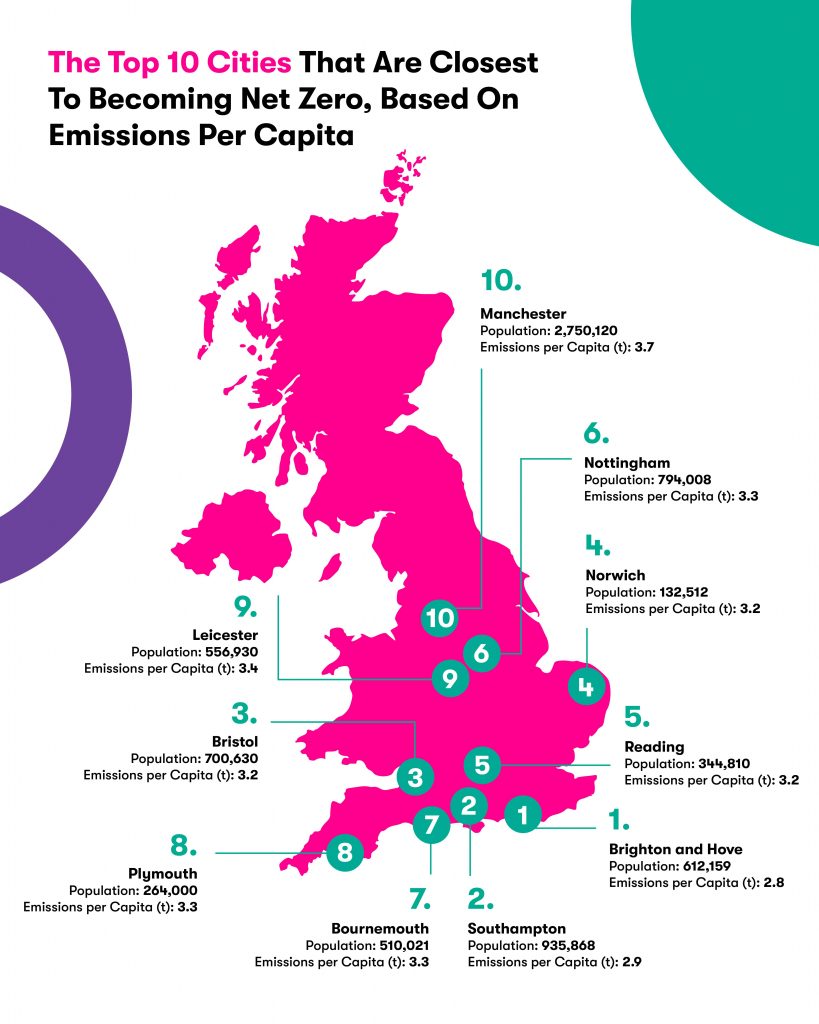
When taking this approach, our findings show that the city with the lowest CO2 emissions per capita is Brighton & Hove, with 2.8t of carbon emissions per capita. Interestingly, whilst the UK has set the target to become net zero by 2050, Brighton’s target is to become net zero by 2030. Brighton & Hove City Council was one of the first councils to recognise and declare a climate emergency, and now they’re leading the way with their Carbon Neutral 2030 programme, which is designed to help businesses, residents and visitors alike to play their part in the fight against climate change.
Brighton & Hove City Council have stated that the ambitious target has been set in order to protect communities, nature, uncontrolled temperature rises/extreme weather, our health, and water supplies and quality. Regarding the latter, water stress is already an issue in the South East, which is one of the reasons why protecting water supplies is vital for the future – by 2050, dry summers in the UK could result in up to 80% less water in our rivers and reservoirs. Given that all of the residents’ drinking water comes from the Brighton Chalk Block, it is vital that groundwater in this natural resource is protected.
As for other cities on our list, Southampton takes second place with 2.9t of carbon emissions per capita, with Bristol, Norwich and Reading taking a joint third spot with 3.2t of carbon emissions per capita. Also taking a place in our list of top 10 cities with the lowest carbon emissions in the UK is Nottingham, Bournemouth and Plymouth with 3.3t emission per capita, closely followed by Leicester (3.4) and Manchester (3.7).
Given that we’re a Manchester-based on-demand customer service company offering call handling services and other forms of outsourced customer service, we’re always proud to see Manchester up there in the rankings. Manchester only just made the top 10 of UK cities with the lowest carbon emissions but, even so, like Brighton & Hove the city is determined to beat the Government’s net zero target of carbon neutrality by 2050. Instead, Manchester aims to be a zero-carbon city by 2038, which is 12 years ahead of the Government’s target for the UK.
The Future of Transport
Another key topic of conversation when it comes to the climate crisis, climate impacts, and becoming net zero is transport, especially as electric vehicles are now becoming more widespread. Transport has the biggest impact and has a lot to answer for regarding the current emissions. However, electric cars are proven to be better for the environment – they emit fewer greenhouse gases and pollutants than when compared with cars that run on petrol or diesel.
Similarly, eBikes are now also popular modes of transport for those that have shorter commutes and don’t necessarily need a car. eBikes use rechargeable batteries and are much faster than a standard bike, making them a preferred choice for commutes. As well as this, eBikes are an energy-efficient and emission-free mode of transportation.
So, we know that these clean vehicles are slowly making their way into our everyday lives, but do the intentions of the UK’s population match? Using Google Keyword Planner, our data experts have looked into the number of monthly searches that are conducted on Google regarding both electric cars and eBikes. Our aim was to analyse the intent of each city’s population when it comes to these modes of transport and make informed decisions about how they travel.
Swapping Petrol and Diesel Cars for Electric Cars
When looking at the monthly search volume for queries relating to electric cars, it appears that the people of Manchester conduct the most searches, with 194,600 searches conducted in September 2021. Of course, a higher search volume in Manchester might be expected as it has one of the larger population sizes. However, given that Manchester does have a greater number of people and a significant number of searches a month for electric cars, this city can have a great impact on the environment if its people were to seriously consider investing in electric vehicles.
Besides Manchester, other cities in the top 5 are Glasgow (182,600 searches), Leeds (180,850 searches), Bristol (175,500 searches), and Edinburgh (160,900 searches). As also evident by the table below, the volume of searches compared to the same period in 2020 has significantly increased, highlighting that people are taking a greater interest in electric cars this year. Of course, some of this may be down to the pandemic – now that people can travel again and are commuting, they might be looking at greener ways to do so. However, the greater interest could also be down to news coverage about climate summits like COP26, net-zero strategy policies, and other climate change commitments.
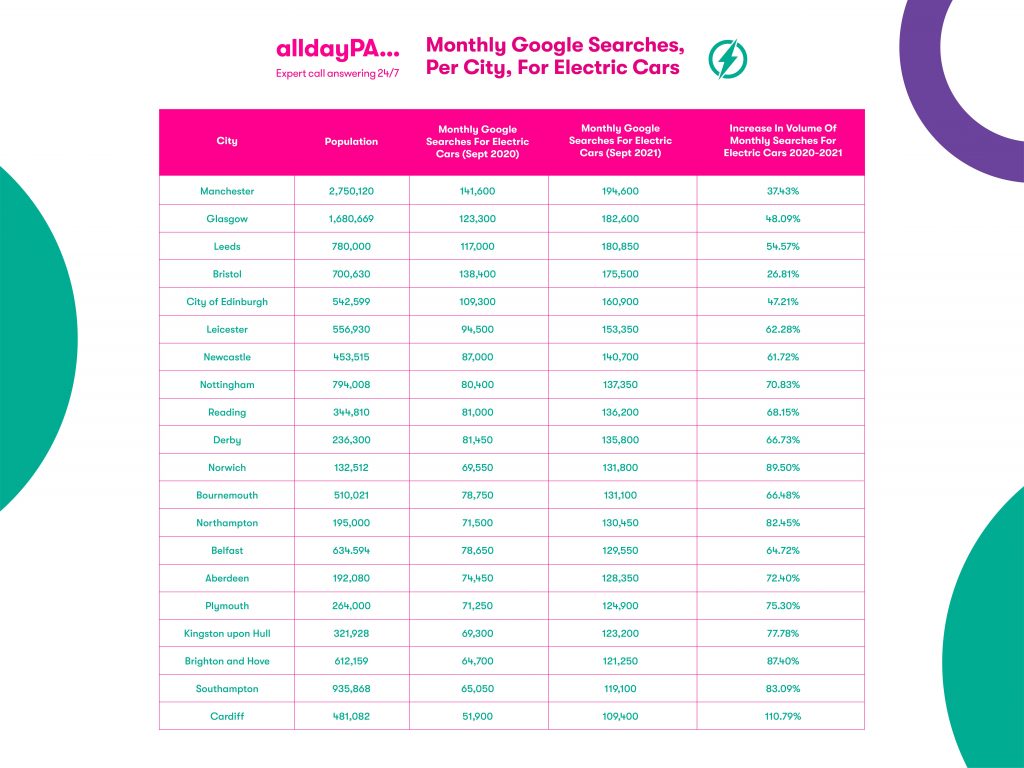
The Use of Electric Bikes
When it comes to electric bikes, there’s a similar trend. Although the top 5 cities based on search volume for eBikes are in a different order when compared to search volume for electric cars, it’s still the same cities that come out on top. In top position is Bristol, with a monthly search volume of 80,150 for eBikes. Next up is Leeds (72,250 monthly searches), followed by Glasgow (72,100 monthly searches), Manchester (70,100 monthly searches) and Edinburgh (69,950 monthly searches). Again, the search volumes have increased across the board from 2020 to 2021, suggesting a rising interest and demand for these greener ways of travelling.
This intent across the population will be largely welcomed by the Government, who aim to decarbonise the UK’s transport system as a part of their plan to be net zero by 2050 (PDF). The Government states that this aim isn’t about stopping people from travelling, but rather changing the way that we travel for the sake of the environment. One of the greatest changes will be the introduction of electric vehicles, so knowing that the people of UK cities are actively looking into these modes of transport is a great step in the right direction!
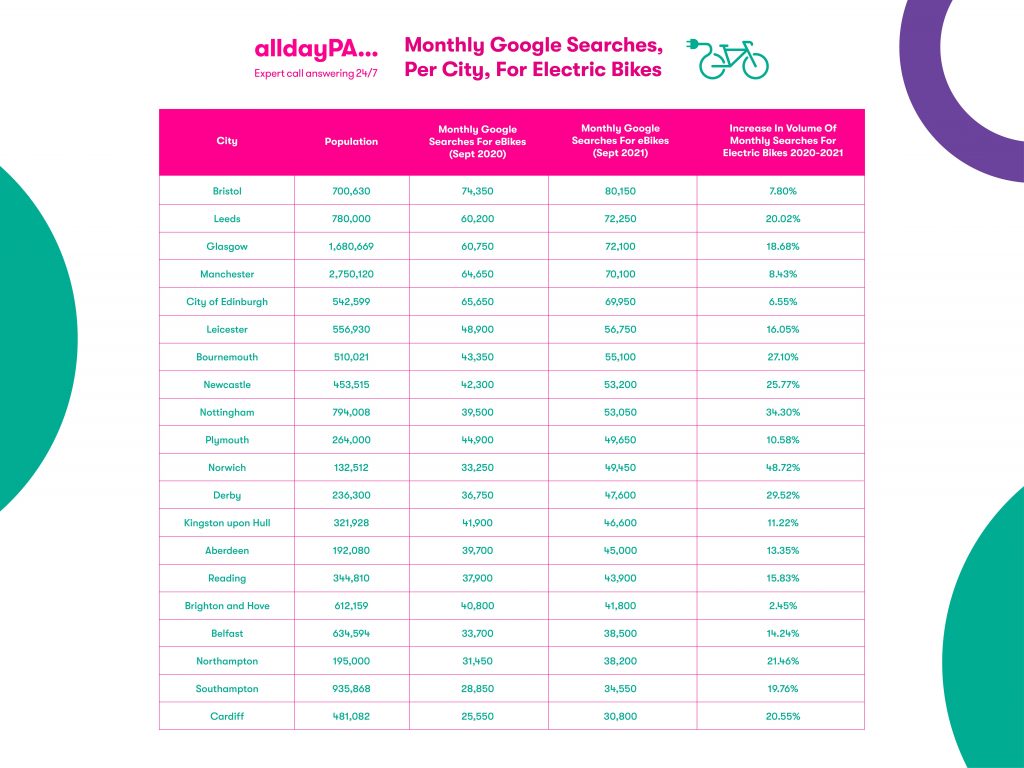
Other Environmental Areas: Air Quality and Recycling
As a part of our analysis, our data experts also looked at the air quality within UK cities and how this is balanced with the number of parks in each of these cities. As mentioned earlier, the emission of greenhouse gases is, to some degree, combated by nature – typically, the planting of trees. Trees take carbon dioxide from the atmosphere, therefore limiting the amount of CO2 in the air, making tree-planting initiatives an effective strategy for combating both the carbon emissions issue and deforestation. Each city was given an air quality rating based on the data (the lower the score, the better the air quality), and our experts then gathered the number of parks per city manually from the associated council website.
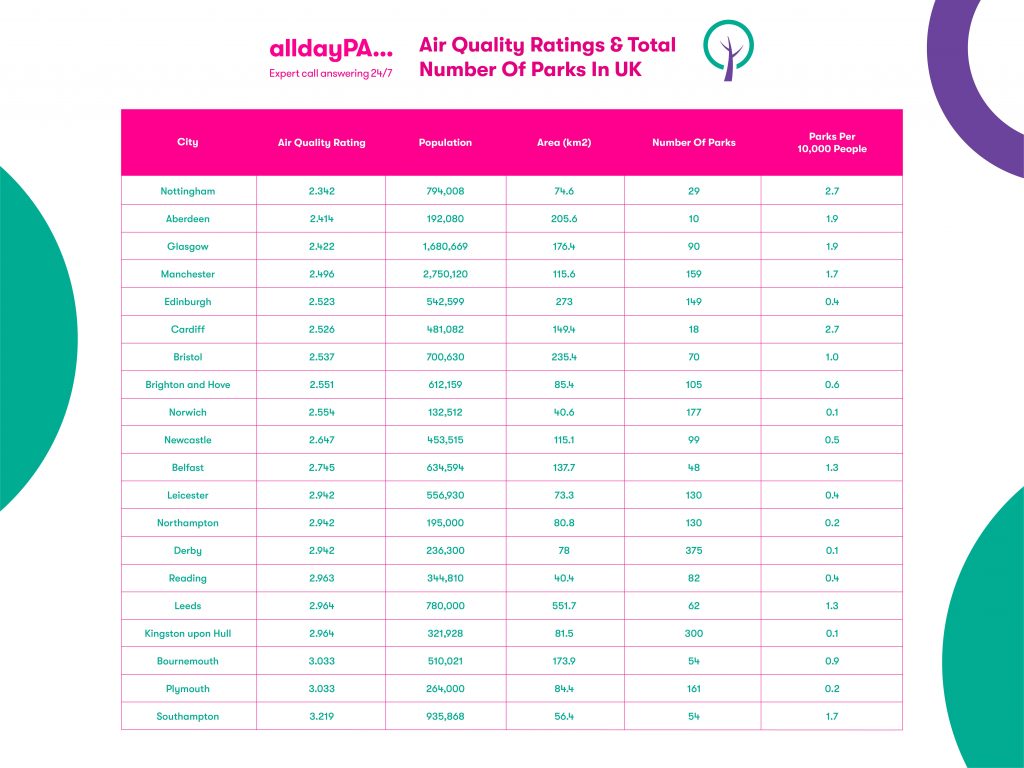
Interestingly, and apart from just a few anomalies, there seems to be a correlation between air quality and the number of parks per 10,000 people. In other words, the cities with the best air quality ratings tend to have more parks per 10,000 people, suggesting that the use of trees to decarbonise the atmosphere may well be working. Nottingham comes out on top here – it has a rating of 2.342 for air quality, which is the best in our table, and it has 2.7 parks per 10,000 people, which is the highest park to people ratio in our table too.
At the opposite end of the table and, again, besides the odd anomaly, the cities with the poorest air quality tend to have fewer parks. For example, Kingston upon Hull has an air quality rating of 2.964, with only 0.1 parks per 10,000 people. Next is Bournemouth with a rating of 3.033 and 0.9 parks per 10,000 people, with Plymouth following with the same air quality rating and just 0.2 parks per 10,000 people.
As shown in the table, Aberdeen, Glasgow, Manchester and Edinburgh are all in the top 5, with Scotland evidently leading the way when it comes to air quality! Interestingly though, Manchester, Edinburgh and Glasgow all came out on top when our data analysts looked at which cities were searching for electric cars and bikes, suggesting that these places are some of the most determined when it comes to combating climate change.
As well as looking at air quality, our data scientists also looked at recycling rates across each of the cities, using a dataset from the Government (XLS) and data from Compare The Market. Recycling means that less energy is needed for sourcing and processing new materials, resulting in lower carbon emissions. With that in mind, council policies on recycling are also vital in the aim to become net zero by 2050, or earlier.
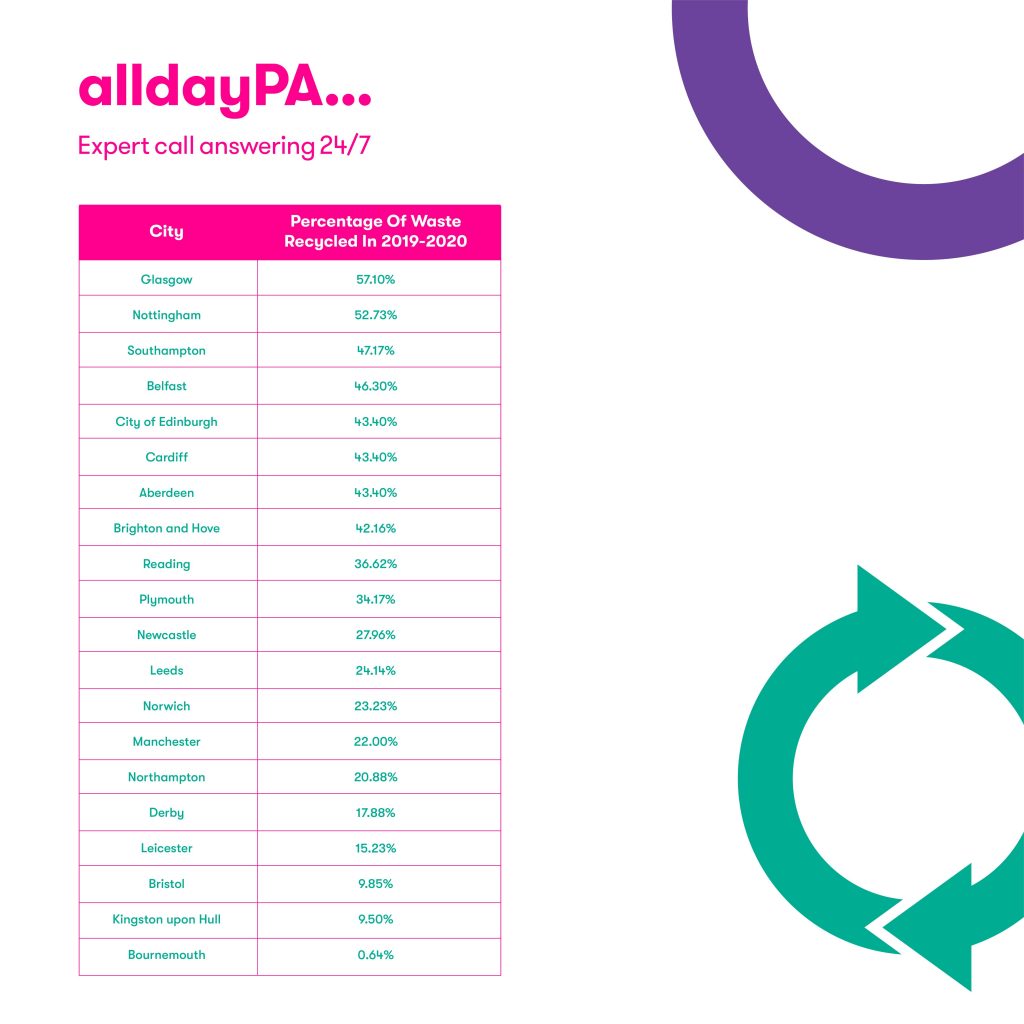
When it comes to recycling, it’s Scottish cities again that seem to be setting the example and leading the way, with Glasgow, Edinburgh and Aberdeen all within the top 7 of cities that recycle their waste (including green waste, plastic, paper, and any other recyclable goods). Glasgow dominates the table with 57.10% of waste recycled in 2019-2020, and then Nottingham follows in second place with 52.73%, Southampton with 47.17%, Belfast with 46.3%, and finally Edinburgh with 43.4%.
Our Thoughts Here at alldayPA…
Our founder, Reuben Singh, commented:
“Manchester was the birthplace of both the industrial revolution and the digital revolution – it is a city and region with a proud heritage of innovation. I’m delighted to see that our city is setting a great example of how the UK can become more environmentally friendly as we are one of the greenest cities in the UK. Through our latest research, we have seen how the North West is leading the way with its Net Zero vision by 2040, a full ten years ahead of the rest of the UK.
“The Net Zero Strategy published by the government has the potential to be transformative in terms of both the environment and the economy. There is an understandable focus on the scale of the challenge, the technology and the costs involved, but it overlooks some of the practical day to day communication that is essential to success. At alldayPA, we support businesses involved in the environmental sector and we’re seeing growth in that area, with businesses needing additional back-office support whilst their teams are out installing and maintaining green tech. Equally important is providing support to consumers – as an example, our customers in the housing sector are responsible for over 250,000 homes, and tenants are anxious about rising energy costs and the cost of ‘going green’. We provide a vital conduit when it comes to being able to answer questions, ally fears and arrange for installations.
Sustainability has been gaining traction in the property sector for some time given the importance of climate change and the current focus on rising energy costs. The Chancellor’s statement means that there is now pressure on both the demand and supply side to drive the property sector towards Net Zero. Buyers and tenants are demanding greener properties, whether new build or retrofitted older properties. From a developer perspective, there’ll be a requirement for real change. Greener property will be a more valuable asset, more attractive to investors and will make a significant contribution as the UK moves towards Net Zero.”
So, Who’s the Closest to Becoming Net Zero?
It’s clear that action on climate change is needed as the cost of inaction is severe – the Government’s climate change targets show this. However, whilst the carbon targets give something to aim for, it’s up to cities, councils and the populations within these areas to do their bit too with domestic action, consistent policies, and city-wide changes. When looking at which city will be the first to reach net zero status, there are a couple of predictions to be made depending on the angle you take.
When looking at which city will become net zero first based on their current CO2 emissions, Brighton & Hove is a clear contender, especially because their City Council have outlined a detailed plan with climate targets of their own, which involve being net zero by 2030. As mentioned throughout the blog though, major Scottish cities like Glasgow and Edinburgh seem to be leading the way in many areas, including recycling rates, air quality, and quantity of parks. So, could it be a Scottish city to reach the net zero finishing line first?
In the meantime, it’s important that we all do our bit in the fight against climate change and the mission to become net zero. For us, it’s great to see our city of Manchester up there in the top 10 for the lowest carbon emissions, best air quality, and search volumes for electric vehicles. Here at alldayPA, we’ll continue to support the efforts to become a net zero city by 2038, and a net zero nation by 2050!